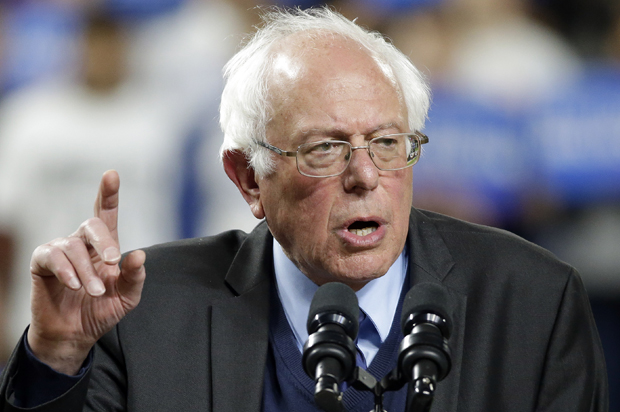The Wisconsin primary will be held Tuesday and Bernie Sanders is likely to win. He holds a modest but consistent lead over Clinton in most of the polls – and the momentum appears to be on his side. Wisconsin is an important state, and a win there certainly breathes life into the Sanders campaign. It won’t, however, alter the broader dynamics of the race.
Because the Democrats award delegates on a proportional basis, Sanders doesn’t just need to win in places like Wisconsin or New York or California – he needs to win by significant margins. Otherwise Clinton’s inevitable march to the nomination proceeds more or less unimpeded. That’s the reality on the Democratic side: Clinton has amassed a substantial delegate lead, and Sanders’ window is closing rapidly.
The Sanders campaign hasn’t conceded the race (and they shouldn’t), but there are indications that even they can see the writing on the wall.
The New York Times ran a story over the weekend in which Sanders staffers talk openly about their long odds and about crucial missteps early in the process. Quoting:
“Mr. Sanders is now campaigning more effectively than many expected, exposing Mrs. Clinton’s weaknesses as a candidate, and is positioning himself to win contests like the Wisconsin primary on Tuesday. But allies and advisers of Mr. Sanders say the missed opportunities to run an aggressive political operation in 2015 that would have presented more of a challenge to Mrs. Clinton. She has now firmly built a big lead in delegates needed to clinch the nomination – a margin that would be smaller if Mr. Sanders had run differently last year, according to interviews with more than 15 people who are on his team or close to him.”
There’s a loose consensus among those interviewed that Sanders entered the fray late in the game, that his decision last fall to not attack Clinton on her Wall Street speaking fees (which he does regularly now) and her use of the private email server as Secretary of State gave Clinton a much-needed pass. “If he had been tougher on her,” said Tom Fiegen, an Iowa state senator who campaigned for Sanders, “it could have made such a difference in Iowa and the states that followed.”
To his credit, Sanders was also committed to doing his job as senator from Vermont, which detracted from his campaign and allowed Clinton to run around the clock – raising money, securing endorsements, etc. against little resistance.
Jane Sanders, Bernie’s wife and an influential adviser, admitted that starting earlier in 2015 would have helped enormously: “We didn’t run all over the nation last year. We spent every week in the Senate; and every weekend, three or four days a week, he would be running around the country. It’s something that gives you pause.”
In those early states like Iowa and Nevada, a Sanders victory could have been a game-changer, both narratively and in terms of the delegate math. “If Clinton had lost Iowa, New Hampshire and Nevada,” said Ted Devine, a key Sanders adviser, “it would have been a devastating series of defeats that would have called into question her entire campaign.” Instead, Clinton won two out of the three, which didn’t end the race but cemented her front-runner status and perhaps made it more difficult for Sanders to defend his viability.
When Sanders began campaigning in Iowa, for instance, he trailed Clinton by as much as 40 points in the polls. He didn’t run ads there until late fall, in fact. And yet he nearly won Iowa, and it’s clear now that he could’ve won had he hit the ground sooner. Or, as Devine noted, “a few more days wooing voters in the western and rural parts of the state” might have tilted the balance in Sanders favor. In any case, the decision was made to defend New Hampshire, which Sanders surely would have won with little effort.
The strategic decision to focus on toss-up states like Colorado and Minnesota, in retrospect, also appears questionable. The Sanders campaign understood they had serious inroads to make with minority voters, particularly in the South, but effectively giving up in places like South Carolina and Alabama and Mississippi handed scores of uncontested delegates to Clinton. These lopsided wins are what created Clinton’s near-insurmountable delegate lead.
But you can play this kind of retrospective game with any campaign. Choices have to be made when they have to be made, and not all of them will pay off. Clinton is a vulnerable candidate; she was and is beatable. “Is there another candidate who could have run a tough negative campaign against her from the beginning and been effective?” Devine said, “Sure, but it couldn’t have been Bernie. That’s just not who he is.”
It’s not who Bernie is, and that’s part of what makes him so refreshing as a candidate. But given how unexpectedly close this race is, it’s not unreasonable to say the landscape could look a lot different right now had Sanders been more aggressive. Ultimately, though, Sanders made a decision to avoid mudslinging and spread his message. As The New York Times pointed out, “By the time he caught fire with voters this winter and personally began to believe he could defeat Mrs. Clinton, she was already on her way to building an all but insurmountable delegate lead.”

